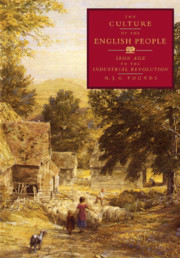Book contents
- Frontmatter
- Contents
- List of illustrations
- List of tables
- Preface
- List of abbreviations
- Map of traditional counties, with abbreviations, as used in this book
- Introduction
- 1 The view from Danebury
- 2 Roman interlude
- 3 House and household
- 4 Heat, light and insecurity
- 5 The house furnished
- 6 Food, its production, preservation and preparation
- 7 In sickness and in death
- 8 The community of parish and village
- 9 The family
- 10 The culture of cities
- 11 The foundations of popular culture
- 12 Conclusion: the end of popular culture
- Notes
- Index
11 - The foundations of popular culture
Published online by Cambridge University Press: 06 July 2010
- Frontmatter
- Contents
- List of illustrations
- List of tables
- Preface
- List of abbreviations
- Map of traditional counties, with abbreviations, as used in this book
- Introduction
- 1 The view from Danebury
- 2 Roman interlude
- 3 House and household
- 4 Heat, light and insecurity
- 5 The house furnished
- 6 Food, its production, preservation and preparation
- 7 In sickness and in death
- 8 The community of parish and village
- 9 The family
- 10 The culture of cities
- 11 The foundations of popular culture
- 12 Conclusion: the end of popular culture
- Notes
- Index
Summary
… the traditional beliefs and customs of the medieval and modern peasant are in nine cases out often but the detritus of heathen mythology and heathen worship … village festivals … are but fragments of naive cults addressed by a primitive folk to the beneficent deities of field, wood and river.
E. K. Chambers, The Medieval StageLes fêtes, les jeux, la danse, la musique, le théâtre, les repas de noces ou de funerailles et surtout l'activité rituelle des groupes de la jeunesse locale et des défunts du village ont pour fonction … de redéfinir fréquemment pour chacun le sens d'appartenance au groupe.
R. Muchembled, Culture populaire et culture des élitesIn chapter 8 brief mention was made of the games and rituals with which people in a local community enlivened their dull lives and induced a sense, if not of well-being, at least of camaraderie. It is appropriate to examine the assumptions and beliefs, the mentalité of ordinary people, which subsumed these activities, and, in so far as this is possible, to trace their origins as far back as practicable. The world-view of traditional peoples was underpinned by the tacit assumption that there were forces external to mankind which could in some way shape human destiny. Both the regularities of nature, the rising and setting of the sun, the phases of the moon, the movements of the planets and the procession of the seasons, no less than its irregularities, like the apparent randomness of weather and the incidence of epidemic disease, called for explanation.
- Type
- Chapter
- Information
- The Culture of the English PeopleIron Age to the Industrial Revolution, pp. 379 - 414Publisher: Cambridge University PressPrint publication year: 1994



